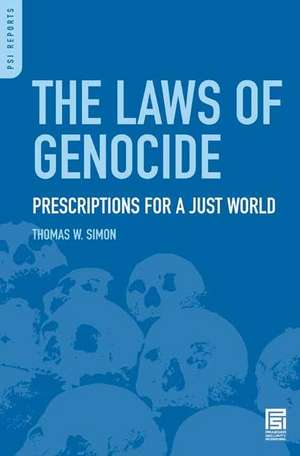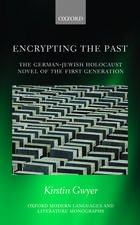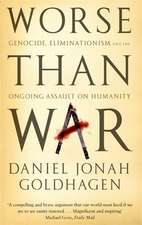The Laws of Genocide: Prescriptions for a Just World: PSI Reports
Autor Thomas W. Simonen Limba Engleză Hardback – 29 iun 2007 – vârsta până la 17 ani
Din seria PSI Reports
- 35%
 Preț: 414.13 lei
Preț: 414.13 lei - 28%
 Preț: 412.88 lei
Preț: 412.88 lei - 28%
 Preț: 361.86 lei
Preț: 361.86 lei - 28%
 Preț: 437.31 lei
Preț: 437.31 lei - 24%
 Preț: 412.88 lei
Preț: 412.88 lei - 28%
 Preț: 412.61 lei
Preț: 412.61 lei - 27%
 Preț: 376.58 lei
Preț: 376.58 lei - 27%
 Preț: 376.43 lei
Preț: 376.43 lei - 28%
 Preț: 438.17 lei
Preț: 438.17 lei - 27%
 Preț: 378.09 lei
Preț: 378.09 lei - 28%
 Preț: 437.75 lei
Preț: 437.75 lei - 24%
 Preț: 459.91 lei
Preț: 459.91 lei - 28%
 Preț: 459.91 lei
Preț: 459.91 lei - 28%
 Preț: 412.79 lei
Preț: 412.79 lei - 24%
 Preț: 459.51 lei
Preț: 459.51 lei - 28%
 Preț: 435.55 lei
Preț: 435.55 lei - 28%
 Preț: 375.66 lei
Preț: 375.66 lei - 24%
 Preț: 462.45 lei
Preț: 462.45 lei - 27%
 Preț: 360.03 lei
Preț: 360.03 lei - 14%
 Preț: 333.24 lei
Preț: 333.24 lei - 28%
 Preț: 437.40 lei
Preț: 437.40 lei - 27%
 Preț: 370.30 lei
Preț: 370.30 lei - 24%
 Preț: 462.45 lei
Preț: 462.45 lei - 24%
 Preț: 463.72 lei
Preț: 463.72 lei - 27%
 Preț: 379.88 lei
Preț: 379.88 lei - 18%
 Preț: 322.02 lei
Preț: 322.02 lei - 18%
 Preț: 335.62 lei
Preț: 335.62 lei - 14%
 Preț: 337.61 lei
Preț: 337.61 lei - 27%
 Preț: 339.36 lei
Preț: 339.36 lei - 26%
 Preț: 348.26 lei
Preț: 348.26 lei
Preț: 376.91 lei
Preț vechi: 519.20 lei
-27% Nou
Puncte Express: 565
Preț estimativ în valută:
72.13€ • 78.32$ • 60.59£
72.13€ • 78.32$ • 60.59£
Carte tipărită la comandă
Livrare economică 23 aprilie-07 mai
Preluare comenzi: 021 569.72.76
Specificații
ISBN-13: 9780275979454
ISBN-10: 0275979458
Pagini: 232
Dimensiuni: 156 x 235 x 22 mm
Greutate: 0.5 kg
Editura: Bloomsbury Publishing
Colecția Praeger
Seria PSI Reports
Locul publicării:New York, United States
ISBN-10: 0275979458
Pagini: 232
Dimensiuni: 156 x 235 x 22 mm
Greutate: 0.5 kg
Editura: Bloomsbury Publishing
Colecția Praeger
Seria PSI Reports
Locul publicării:New York, United States
Notă biografică
Thomas W. Simon a philosopher and lawyer, teaches at Illinois State University. His publications include Democracy and Social Injustice (1995) and Law & Philosophy (2000). He was a Liberal Arts Fellow at Harvard Law School and a founding faculty member of Miyazaki International College in Japan. He also has taught law in Slovenia and Kosovo. He founded and edited Injustice Studies, an electronic journal. He regularly consults for the United Nations (Working Group on Minorities) and the American Bar Association (Central/Eastern European Law Initiative). He served on a drafting committee for Albania's new constitution. As a practicing attorney, he has represented a Diaspora Rwandan group.
Recenzii
Professional collections.
Simon (Illinois State U.) presents a normative and prescriptive legal analysis of genocide. Contending that international law has wrongly modeled its treatment of genocide on national criminal law, which focuses on individual responsibility, he presents chapters providing what he views as a more accurate analysis of the different elements constituting the crime of genocide the criminal act (massive killings), criminal intent (organizational policies), motive (institutionalized hatred), victims (targeted groups defined by the perpetrator), and criminal agent (primarily organizations) and considering the implications of such analysis for reformulating international legal approaches to the crime of genocide.
Simon (Illinois State U.) presents a normative and prescriptive legal analysis of genocide. Contending that international law has wrongly modeled its treatment of genocide on national criminal law, which focuses on individual responsibility, he presents chapters providing what he views as a more accurate analysis of the different elements constituting the crime of genocide the criminal act (massive killings), criminal intent (organizational policies), motive (institutionalized hatred), victims (targeted groups defined by the perpetrator), and criminal agent (primarily organizations) and considering the implications of such analysis for reformulating international legal approaches to the crime of genocide.












